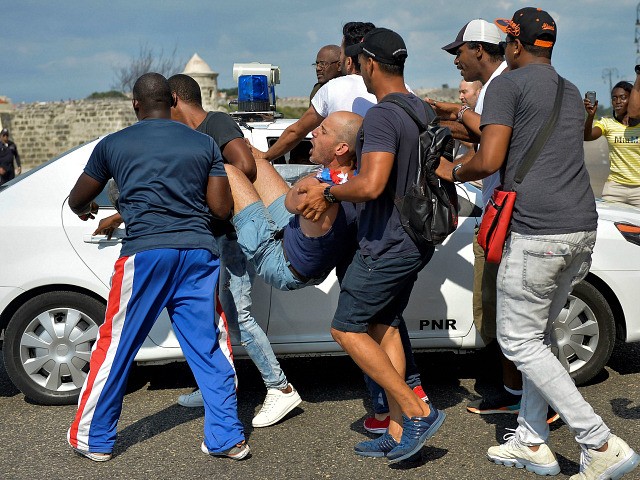An NGO that tracks politically motivated arrests in Cuba announced on Monday that it had documented 3,157 such detentions in 2019, slightly more than in 2018 but significantly fewer than the upwards of 8,000 arrests common during the presidency of Barack Obama.
Obama announced the adoption of policies favoring the communist Castro regime in 2014, expanding American corporations’ access to Cuba and encouraging travel there (American tourism is still technically illegal to Cuba). Obama legalized cruises under “people to people” exceptions to the decades-old embargo and himself visited Cuba in 2016, attending a baseball game with dictator Raúl Castro.
President Donald Trump has significantly undone Obama’s Cuba policy. This year, the Trump administration banned cruises to Cuba, ended “people-to-people” travel, and imposed increasing sanctions on the repressive communist regime, resulting in a drop in tourism in general to the island and corresponding with a trending drop in the number of political dissident arrests.
According to the Cuban Observatory for Human Rights, which uses dissident networks to track arrests in Cuba, the regime conducted 3,157 political arrests in 2019. This does not mean that the regime arrested over 3,000 people — many of these arrests target the same individuals, arresting them and keeping them in prison for short terms to statistically manipulate the number of political prisoners on the island. Individuals like Berta Soler, the head of the Ladies in White Catholic dissident group, were often arrested on a weekly basis, detained for a day or two, and released, so even if the time they spend in jail totals months, they never count to human rights groups as “political prisoners.”
The short-term arrest policy also allows Cuba to avoid having to charge political dissidents with any crime or giving them due process in the legal system.
The Cuban Observatory noted that the number of arrests this year was slightly higher than in 2018, when they documented 2,525 arrests. It is lower than the number in 2017 — 4,821 arrests — and represents a significant decline from the Obama years.
The Observatory documented 8,970 political arrests in 2014, the earliest year they made available in their release showing the 2019 totals. A year later, the group documented 8,314. Politically motivated arrests peaked in 2016, when President Obama visited Havana, with 9,351 incidents, according to Cuban Observatory tallies.
That year, during a joint press conference with Obama, Raúl Castro asserted that Cuba does not imprison dissidents.
“What political prisoners? Give me a name, or names, or after this meeting is over you can give me a list of political prisoners and if we have those political prisoners they will be released before tonight ends,” he told CNN’s Jim Acosta. Several human rights groups responded to the call with vetted lists of political prisoners, which Castro ignored.
Castro and his figurehead, “president” Miguel Díaz-Canel, have lost significant income revenues during the Trump era that could have gone to fortifying the state security apparatus. In 2019 alone, the Trump administration intervened to cancel a lucrative deal between the Castro regime and Major League Baseball that would have hurt Cuban baseball players attempting to flee communism; ended all “people to people” trips to Cuba on the grounds that the embargo exception was abused for tourism; cut government “cultural exchanges” with Cuba; and ended corporate tourist cruises to Cuba.
Tourism revenues to Cuba — in which the Cuban regime includes travelers from the United States, exposing that “cultural” trips to Cuba do illegally constitute tourism — dropped 8.5 percent in 2019, according to regime numbers.
Despite improvement from recent years, 2019 nonetheless represented an increase in repression. Some of these arrests occurred as a result of the visit of King Felipe and Queen Letizia of Spain to Havana — “These sorts of visits bring a lot of collateral damage,” dissident Marta Beatriz Roque said in 2016, as the regime tries to hide its dissidents from the public when celebrities arrive. Other arrests occurred via new methods: the NGO noted an increase in house arrest cases, which also allows Havana to bend statistics on political prisoners, unpayable fines, and beatings without bringing someone into custody. Cuba also employed an entirely new tactic this year: forcibly exiling dissidents it deemed too difficult to subdue via violence. Currently, the known cases of forced exile all found themselves in Guyana.
“The completed 2019 has been disastrous for the exercise of human rights in Cuba. The class that controls the resources of political and economic power continues not to give any space to the exercise of human rights on the part of citizens and represses through diverse methods and divergent expression,” Alejandro González Raga, the executive director of the Cuban Observatory for Human Rights, said in a statement accompanying the new data. “Cuba enters a new year without abandoning its long cycle of repression and backwardness that it has lived for over six decades.”
Among the most prominent political prisoners currently behind bars without due process of law is the head of the largest dissident organization on the island, the Patriotic Union of Cuba (UNPACU), José Daniel Ferrer. Ferrer disappeared on October 1, 2019, and resurfaced only after weeks of international outrage and protests by his wife and children. When he did, in November, the human rights group Cuban Prisoners Defenders said that wife Nelva Ortega relayed to them that Ferrer had been forced to drink “semi-fecal” water and rotten food, intended to worsen an ulcer he had been treating before his arrest. While the Cuban regime regularly calls Ferrer a “mercenary” of the United States, no court has charged him with a crime. He remains in prison at press time.

COMMENTS
Please let us know if you're having issues with commenting.